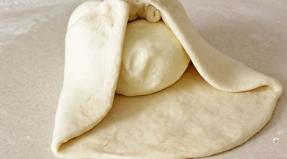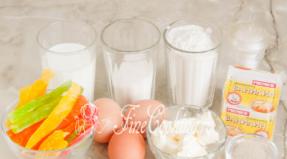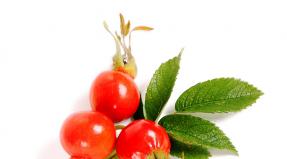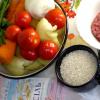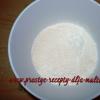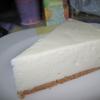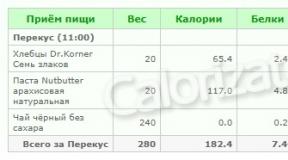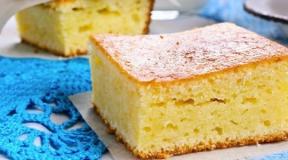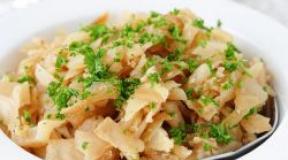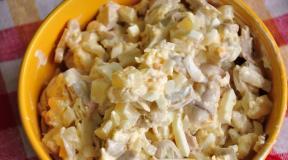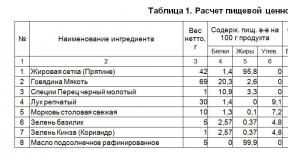Kefir: calorie content and nutritional value. Kefir for weight loss - useful properties and calorie content Does kefir contain carbohydrates
Kefir is good for your health. This fermented milk product is able to improve the functioning of the gastrointestinal tract and increase immunity. Many people are interested in the properties of kefir for weight loss. Is it true that you can drink it in unlimited quantities? Kefir, whose calorie content is low, is very useful for those who want to lose weight. Let's tell you more about the fermented milk product.
Kefir: calories, proteins, fats, carbohydrates
Kefir is a delicious product that is obtained by fermenting milk. The process occurs naturally due to beneficial bacteria. Therefore, kefir is easy to cook at home.
The benefits of kefir for the body are undeniable, and there are practically no contraindications for its use. The fermented milk product helps to improve digestion, relieves constipation, insomnia, edema. Also, kefir is recommended for those who are constantly under stress, as it has a beneficial effect on the nervous system.
It is worth remembering that the healing properties of kefir depend on the time that has passed since the day of fermentation of milk: with each subsequent day, the composition of the product changes. For example, a one-day product contains only 0.07% ethyl alcohol, and a three-day product contains 0.88% - such kefir is not recommended for people with gastrointestinal tract diseases, children and patients with epilepsy.
How many calories are in kefir? It is impossible to unequivocally answer this question, since the numbers depend on the fat content of the product. Accordingly, the content of proteins, fats and carbohydrates is also different.

Consider the composition of a fermented milk product of different fat content (per 100 g of product):
- Low-fat kefir (0%): proteins - 3.0, carbohydrates - 3.6, fats - 0. Calorie content - 38 kcal.
This product is the best option for weight loss and dietary nutrition.
- Kefir with a fat content of 1%: proteins - 2.8, carbohydrates - 3.8, fats - 1. Calorie content - 40 kcal.
It is believed that such a product can also be used for weight loss or gastrointestinal diseases.
The calorie content of kefir is not much higher than fat-free, but there are more nutrients in such a product.
- Kefir with a fat content of 1.5%: proteins - 3.4, carbohydrates - 4, fats - 1.5. The calorie content of the product is 40 kcal.
It is a more nutritious drink. We also note that the taste of such kefir is higher than that of the "low-fat brothers".
- Kefir with a fat content of 2%: proteins - 3.6, carbohydrates - 3.9, fats - 2. Caloric content -45 kcal.
Such kefir is less common, so it is not easy to find it on the shelves. In terms of taste, it is not inferior to kefir 2.5%, but the calorie content is slightly lower.

- Kefir with a fat content of 2.5%: proteins - 2.8, carbohydrates - 3.9, fats - 2.5. The calorie content of the product is 50 kcal.
The most common product. It is on such kefir that fasting days can be spent, since it contains the most vitamins and minerals, thanks to which hunger is not so felt.
- Kefir with a fat content of 3.2%: proteins - 2.8, carbohydrates - 4, fats - 3.2. The calorie content of the product is 56 kcal.
This is the most fatty kefir that can be consumed by those who are not concerned with the problem of excess weight. The rest are better off choosing a more dietary option.
As you can see, the calorie content and composition of kefir, the benefits of this product depend on its fat content. Choose a drink based on your own goals and preferences.
Kefir for a diet
You've probably heard about the benefits of kefir for weight loss. Indeed, this product helps well in the difficult fight against excess weight, so it can be consumed even at night. However, you should not drink kefir around the clock, otherwise it can badly affect your health.

Interested in when and how to use kefir for weight loss? Let's figure it out.
Kefir is a low-calorie product, while it is quite nutritious, so you don't feel much hunger. In addition, kefir cleanses the body and accelerates metabolism, which is important for weight loss. So, regular consumption of the product along with proper nutrition gives good results.
Do you think which kefir is best for your diet? Nutritionists urge not to get carried away with low-fat kefir, since it is believed that this product is homogenized. It is better to opt for kefir with a fat content of 1%. It is permissible to use a product with a fat content of 2.5%, but they can only replace dinner.
So, how to use kefir for weight loss? There are several options - to include the product in the diet, replace dinner, drink at night, or spend fasting days on kefir.

If the weight reserve is large enough or you want to lose weight in a short time, try the kefir diet. It is believed that it is not harmful to the body and helps to get rid of excess weight without difficulty.
The kefir diet menu is very simple. For a week you should eat the following foods:
- 1st day - kefir and any vegetables (except potatoes);
- 2nd day - kefir and cottage cheese;
- 3rd day - kefir and any fruits (excluding grapes and bananas);
- 4th day - kefir and boiled chicken breast;
- 5th day - kefir and baked potatoes;
- 6th day - kefir and boiled buckwheat;
- 7th day - kefir and green apples.
Drink no more than a liter of kefir with a fat content of 1% per day. The amount of other food should not exceed 500 g.
Such a diet is easily tolerated, and the result can be a weight loss of up to 5 kg.
If you don't want to go on diets, replace your usual dinner with a glass of kefir with a fat content of 2.5%. Less starchy foods, sweet, fried - and in a week you will notice the result.
Also try drinking kefir before bed. Although it is believed that you cannot eat at night, a fermented milk product is a pleasant exception to the rule.
Kefir will saturate the body without overloading it, will give a feeling of lightness and satiety. The body spends a lot of calories on digesting this product, so you can lose weight without much effort.
To achieve the result, follow the diet, choose kefir with a fat content of 0% or 1% and drink it at least half an hour before bedtime.
If drinking plain kefir is boring, add cinnamon or grated ginger to it - seasonings will increase the fat-burning properties of the product.

If you want to try a fasting day on kefir, do this: buy a dairy product with a fat content of 2.5% and drink half a glass every two hours. You can't eat anything else. In addition to kefir, drink pure non-carbonated water or green tea.
If it is difficult to maintain such a diet, add 300 g of low-fat cottage cheese to the diet and eat it along with kefir, dividing it into small portions.
Kefir is an excellent product for well-being and proper weight loss. However, everything is fine in moderation - do not get carried away with diets and do not overdo it with the use of a fermented milk product.
Kefir has been known all over the world for several centuries. It is popular in many countries, and each has its own recipe for the preparation of the product, a special name and a specific taste and aroma. In Georgia - yogurt, in Bashkiria - kumis, in Uzbekistan - katyk, in Armenia - matsun.
Product preparation
This fermented milk drink is formed by fermenting whole or skimmed cow's milk. It is also made from sheep's milk or mare's milk (depending on the country).
If we consider in detail, then kefir is nothing more than a symbiosis, complex and not fully investigated (it has not been obtained industrially), consisting of acetic acid bacteria, streptococci, lactic acid sticks, substances that create aroma, and yeast. ... When the starter culture is placed in milk, fermentation processes are started.
The first kefir came to Russia in 1909 from North Ossetia.
There are two main ways to get the product:
- Natural - by fermenting milk in a container in a warm place for 3-5 days without access to sunlight, followed by filtering.
- Industrial - a special starter culture from lactic acid bacteria is introduced into milk.
Now you can cook kefir yourself at home. It is enough to buy ready-made kefir fungus or sourdough in a store or pharmacy.
Nutritional value of kefir 1% fat
The composition of BZHU kefir (1 percent fat) is represented by the following values: 2.8 / 1.0 / 4.0 g
Let's compare the ratio of BJU (proteins, fats, carbohydrates) in one percent kefir from different manufacturers:
- home - 3.2 / 3.5 / 4.8 g, respectively, per 100 grams of product;
- "Bio Balance" - 3.0 / 1.0 / 5.0 g;
- "Prostokvashino" - 2.88 / 1.19 / 3.97 g;
- "House in the Village" - 2.83 / 0.94 / 3.99 g;
- Biomax - 3.00 / 1.0 / 5.6 g;
- "Cheerful milkman" - 2.9 / 1.08 / 3.98 g
.jpg)
Energy value of the drink
The calorie content in the usual 1% kefir is 40 kcal.
But constantly calculating how many calories are in a glass, spoon, etc., does not seem appropriate due to the severity, duration and laboriousness of the process. Therefore, you can use ready-made data:
- A 250 ml glass contains 100 kcal.
- A glass of 200 ml - 80 kcal.
- The calorie content of a liter of 1 percent kefir is 400 kcal.
Kefir 1 percent from different manufacturers differs in varying indicators for this parameter:
- Homemade - 63.3 kcal.
- Calorie content of kefir "Bio Balance" - 41 units.
- "Prostokvashino" - 37.22.
- "House in the village" - 37.06 kcal.
- Biomax - 43.30 units.
- "Cheerful Milkman" - 36.92 kcal.
A noteworthy fact about the drink is the following: you can get drunk from kefir, so drivers are not recommended to drive after taking the product (when checking, the alcohol content in the body will correspond to alcohol intoxication).
The product is characterized by a high content of vitamins of group B, C, H, A, beta-carotene, saturated with phosphorus, cobalt, potassium, selenium, manganese, chromium, sodium, and many other minerals.
The total calorie content of 1 percent kefir is 40 kcal. 100 g of the drink contains 2.9 g of protein, 4 g of carbohydrates and only 1 g of fat.
Of all types of kefir, 1 percent product is considered the most useful. The drink has pronounced anti-inflammatory and antimicrobial properties, and, with regular use, helps to normalize the functioning of the digestive tract.
Calorie content of kefir in a glass
The total calorie content of kefir in a glass is:
- 114 kcal - for a 3.2 percent product;
- 98 kcal - for a 2.5 percent drink;
- 80 kcal - if kefir is 1%;
- 60 kcal - when using a fat-free product.
Calorie content of fat-free kefir
If you really watch your health, we recommend that you drink low-fat kefir, the calorie content of which does not exceed 30 kcal. The fat content in 100 grams of this drink is only 0.1 g.
Today this product is actively used for cooking "summer" dishes, along with corn and oat flakes.
Calorie content of kefir 2.5%
Considering the calorie content of kefir 2.5%, we note that it is also not large. 100 g of product contains 49 kcal. A small amount of fat (2.5 g per 100 g of product) makes kefir an indispensable component of dietary nutrition. This product is ideal for okroshka.
The benefits of kefir
The obvious benefits of kefir are as follows:
- regular consumption of the drink helps to restore the microflora of the intestines and stomach;
- the rich vitamin and microelement composition of the product makes kefir an excellent remedy for restoring the body after stress, heavy physical exertion and illness;
- the property of kefir is known to alleviate the hangover syndrome;
- numerous experiments have confirmed that the drink has an anti-sclerotic effect;
- the product is recommended for the normalization of the liver and kidneys;
- kefir promotes better assimilation of nutrients entering the body;
- the low calorie content of kefir per 100 grams makes the drink preferable for obesity and weight loss.
The harm of kefir
Despite the fact that the harm of kefir is extremely rare, the use of the product has a number of contraindications. So, you can't give a drink to babies. Kefir is saturated with coarse protein, which is not able to assimilate the body of a newborn.
Other contraindications are increased acidity of the stomach, a high tendency to indigestion.
Quite often, customers are offered not kefir, but an unhealthy kefir product. Remember, high-quality white kefir, without additional specific odors, is stored for up to 10-14 days, has more than 10 to the 7th degree of beneficial microorganisms.
CHEMICAL COMPOSITION AND NUTRITIONAL ANALYSIS
Nutritional value and chemical composition "Kefir 1% fat".
The table shows the content of nutrients (calories, proteins, fats, carbohydrates, vitamins and minerals) per 100 grams of edible part.
| Nutrient | amount | Norm** | % of the norm in 100 g | % of the norm in 100 kcal | 100% normal |
| Calorie content | 40 kcal | 1684 kcal | 2.4% | 6% | 4210 g |
| Protein | 3 g | 76 g | 3.9% | 9.8% | 2533 g |
| Fats | 1 g | 56 g | 1.8% | 4.5% | 5600 g |
| Carbohydrates | 4 g | 219 g | 1.8% | 4.5% | 5475 g |
| Alcohol (ethyl alcohol) | 0.03 g | ~ | |||
| Organic acids | 0.9 g | ~ | |||
| Water | 90.4 g | 2273 g | 4% | 10% | 2514 g |
| Ash | 0.7 g | ~ | |||
| Vitamins | |||||
| Vitamin B1, thiamine | 0.04 mg | 1.5 mg | 2.7% | 6.8% | 3750 g |
| Vitamin B2, riboflavin | 0.17 mg | 1.8 mg | 9.4% | 23.5% | 1059 g |
| Vitamin B4, choline | 15.8 mg | 500 mg | 3.2% | 8% | 3165 g |
| Vitamin B5, pantothenic | 0.2 mg | 5 mg | 4% | 10% | 2500 g |
| Vitamin B6, pyridoxine | 0.025 mg | 2 mg | 1.3% | 3.3% | 8000 g |
| Vitamin B9, folate | 3 μg | 400 mcg | 0.8% | 2% | 13333 g |
| Vitamin B12, cobalamin | 0.2 μg | 3 μg | 6.7% | 16.8% | 1500 g |
| Vitamin C, ascorbic | 0.7 mg | 90 mg | 0.8% | 2% | 12857 g |
| Vitamin D, calciferol | 0.012 μg | 10 mcg | 0.1% | 0.3% | 83333 g |
| Vitamin H, biotin | 3.2 μg | 50 mcg | 6.4% | 16% | 1563 g |
| Vitamin PP, NE | 0.9 mg | 20 mg | 4.5% | 11.3% | 2222 g |
| Niacin | 0.1 mg | ~ | |||
| Macronutrients | |||||
| Potassium, K | 146 mg | 2500 mg | 5.8% | 14.5% | 1712 g |
| Calcium, Ca | 120 mg | 1000 mg | 12% | 30% | 833 g |
| Magnesium, Mg | 14 mg | 400 mg | 3.5% | 8.8% | 2857 g |
| Sodium, Na | 50 mg | 1300 mg | 3.8% | 9.5% | 2600 g |
| Sulfur, S | 30 mg | 1000 mg | 3% | 7.5% | 3333 g |
| Phosphorus, Ph | 90 mg | 800 mg | 11.3% | 28.3% | 889 g |
| Chlorine, Cl | 100 mg | 2300 mg | 4.3% | 10.8% | 2300 g |
| Trace elements | |||||
| Aluminum, Al | 50 mcg | ~ | |||
| Iron, Fe | 0.1 mg | 18 mg | 0.6% | 1.5% | 18000 g |
| Iodine, I | 9 μg | 150 mcg | 6% | 15% | 1667 g |
| Cobalt, Co | 0.9 μg | 10 mcg | 9% | 22.5% | 1111 g |
| Manganese, Mn | 0.005 mg | 2 mg | 0.3% | 0.8% | 40,000 g |
| Copper, Cu | 12 mcg | 1000 mcg | 1.2% | 3% | 8333 g |
| Molybdenum, Mo | 5 μg | 70 mcg | 7.1% | 17.8% | 1400 g |
| Tin, Sn | 15 mcg | ~ | |||
| Selenium, Se | 1 μg | 55 mcg | 1.8% | 4.5% | 5500 g |
| Strontium, Sr | 17 mcg | ~ | |||
| Fluorine, F | 20 mcg | 4000 mcg | 0.5% | 1.3% | 20,000 g |
| Chrome, Cr | 2 μg | 50 mcg | 4% | 10% | 2500 g |
| Zinc, Zn | 0.4 mg | 12 mg | 3.3% | 8.3% | 3000 g |
| Digestible carbohydrates | |||||
| Mono- and disaccharides (sugars) | 4 g | max 100 g | |||
| Sterols (sterols) | |||||
| Cholesterol | 3 mg | max 300 mg | |||
| Saturated fatty acids | |||||
| Saturated fatty acids | 0.7 g | max 18.7 g | |||
| Monounsaturated fatty acids | 0.3 g | min 16.8 g | 1.8% | 4.5% | |
| Polyunsaturated fatty acids | 0.048 g | from 11.2 to 20.6 g | 0.4% | 1% | |
| Omega-3 fatty acids | 0.01 g | from 0.9 to 3.7 g | 1.1% | 2.8% | |
| Omega-6 fatty acids | 0.03 g | 4.7 to 16.8 g | 0.6% | 1.5% |
Energy value Kefir 1% fat is 40 kcal.
- Glass 250 ml \u003d 250 gr (100 kcal)
- Glass 200 ml \u003d 200 gr (80 kcal)
- A tablespoon ("with a top" except for liquid products) \u003d 18 g (7.2 kcal)
- Teaspoon ("top" except for liquid products) \u003d 5 g (2 kcal)
Main source: Skurikhin I.M. and other Chemical composition of food products. ...
** This table shows the average norms of vitamins and minerals for an adult. If you want to know the norms based on your gender, age and other factors, then use the application "My Healthy Diet".
Product calculator
The nutritional value
Serving size (g)
BALANCE OF NUTRIENTS
Most foods cannot contain the full range of vitamins and minerals. Therefore, it is important to eat a variety of foods to meet the body's needs for vitamins and minerals.
Calorie analysis of the product
SHARE OF BZHU IN CALORIES
The ratio of proteins, fats and carbohydrates:
Knowing the contribution of proteins, fats and carbohydrates to calorie content, one can understand how a product or diet corresponds to the norms of a healthy diet or the requirements of a particular diet. For example, the US and Russian Ministry of Health recommends that 10-12% of calories come from protein, 30% from fat, and 58-60% from carbohydrates. The Atkins Diet recommends low carb intake, although other diets focus on low fat intake.
Rich in vitamins and minerals such as: calcium - 12%, phosphorus - 11.3%
Why Kefir 1% fat is useful
- Calcium is the main component of our bones, acts as a regulator of the nervous system, participates in muscle contraction. Calcium deficiency leads to demineralization of the spine, pelvic bones and lower extremities, increases the risk of osteoporosis.
- Phosphorus takes part in many physiological processes, including energy metabolism, regulates acid-base balance, is a part of phospholipids, nucleotides and nucleic acids, is necessary for the mineralization of bones and teeth. Deficiency leads to anorexia, anemia, rickets.
Energy value, or calorie content is the amount of energy released in the human body from food during digestion. The energy value of a product is measured in kilo-calories (kcal) or kilo-joules (kJ) per 100 grams. product. The kilocalorie used to measure the energy value of food is also called the food calorie, so the prefix kilo is often omitted when specifying calories in (kilo) calories. You can see detailed energy tables for Russian products.
The nutritional value - the content of carbohydrates, fats and proteins in the product.
Nutritional value of food product - a set of properties of a food product, in the presence of which the physiological needs of a person for the necessary substances and energy are satisfied.
Vitamins, organic substances required in small quantities in the diet of both humans and most vertebrates. Vitamins are usually synthesized by plants rather than animals. The daily human need for vitamins is only a few milligrams or micrograms. Unlike inorganic substances, vitamins are destroyed by strong heating. Many vitamins are unstable and are "lost" during cooking or food processing.
Calories, kcal:
Proteins, g:
Carbohydrates, g:
An excellent lactic acid product, kefir appeared in the process of human evolution, as a result of the need to preserve food and the inability to do so. There were no refrigeration chambers and therefore humanity came up with various ways. As an example, this is the invention of such a fermented milk product as kefir. But it turned out that kefir not only preserves milk protein, but is also a tasty and quite healthy product.
Kefir is one of the most common fermented milk drinks, an alcohol-containing product. Kefir is produced by the method of alcoholic (yeast) fermentation, caused by the addition of kefir fungi to the heated one. Kefir 1% has a white color, a liquid homogeneous consistency with bubbles and a traditional kefir taste - moderately sour, slightly spicy.
Calorie content of kefir 1%
The calorie content of 1% kefir is, on average, 37-40 kcal per 100 grams of product, depending on the method of preparation.
The composition of real kefir 1% should contain only two ingredients: normalized in terms of fat content and ferment on kefir fungi.

Kefir 1% contains proteins that are necessary as a building material for the cells of the whole body (calorizator). The drink has an ideal ratio and, which makes kefir indispensable for children and adolescents, athletes and the elderly, because it strengthens bone tissue. Kefir 1%, due to the presence of kefir starter culture, has a beneficial effect on the activity of the gastrointestinal tract, moreover, kefir 1% of the first and second days of production has a mild laxative effect.
Kefir harm 1%
People with weak intestines need to use kefir with caution, the drink can provoke bloating and discomfort in the stomach. Kefir is not recommended for peptic ulcer disease and increased acidity of the stomach.
With a minimum fat content of 1%, kefir is a supplier of complete protein, which is very important during diets and fasting days. Therefore, many methods of nutrition, for example, or use kefir 1% in their diet. Also in dietetics, a fasting day or a fasting week with kefir is often used. But before trying such a diet on yourself, consult your doctor if you have any contraindications to it.

Selection and storage of kefir 1%
When purchasing kefir of any fat content, you need to pay attention to the date of manufacture. It is necessary to store the drink in the refrigerator, no longer than the shelf life, which, as a rule, does not exceed 10 days.
Kefir 1% in cooking
Kefir 1% is an excellent standalone drink, the base of savory sauces with fresh and or cold summer soups. Kefir is used for the preparation of baked pastries, pancakes and pancakes.
For more information about kefir, see the video clip “Kefir. Russian product ”of the TV show“ Life is great! ”.
Specially for
Copying of this article in whole or in part is prohibited.
